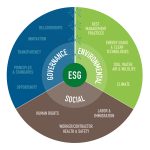Kellen West is Vice President of Portfolio Management and one of the original members of AgIS Capital at the firm’s founding in 2013. Previously he worked within the third-party fixed income department at John Hancock Asset Management, where he was the lead analyst for REITs, Gaming, and Insurance. Kellen also previously served as an investment analyst with the Hancock Agricultural Investment Group. Kellen graduated summa cum laude with a BSBA degree from Boston University and is originally from Oklahoma.

Kellen, as an original member of the team that built AgIS Capital, what was it like coming from John Hancock Asset Management to AgIS Capital?
I felt joining AgIS Capital at its launch was an exciting opportunity that would enable me to make an impact on an organization from its formative stages. My position at John Hancock Asset Management was rewarding and carried significant responsibility though being a sector analyst did not provide the same ability to impact an organization from the ground up. The partners at AgIS Capital formed the business to create an opportunistic and flexible company that could drive value for clients; by joining at the launch, I was able to learn from the partners’ significant experience while also being empowered to make my own mark on how we could best deliver results for our clients.
What drives your interest in the agricultural asset class and what do you see long-term for the asset class?
I had little experience with agriculture growing up in Oklahoma. My work experiences were primarily related to finance prior to working at John Hancock and AgIS Capital. My interest in the asset class relates to farmland’s role in a portfolio of assets and how the tangible aspects of the investments interplay with the financial underwriting and analysis we perform. Most traditional investments are intangible or passive – a stock, bond, commercial building, or other financial contract, for example. But agriculture investments have the excitement of being a living investment; returns are driven not by an occupancy rate, how many widgets a factory can produce, or whether a company exceeds its quarterly consensus estimates. Instead, income is generated from a product that took years to develop, from preparing land, planting trees or vines, and then nurturing those plants until they begin producing a saleable fruit or nut crop, for example. It is much more exciting to have an investment that has such a story and for which you can literally have your boots on the ground and see it in person.
Going forward, I expect the asset class to continue playing a niche role in institutional investors’ portfolios. This role seems to be increasing and based on the characteristics of the asset class, I believe investors will continue valuing the benefits that the asset class uniquely provides.
Can you provide us with what your typical day is like within the Portfolio Management Team?
I wake up at 7am and arrive at work around 8. A typical day does not really exist – part of the fun of the position is having a non-routine work schedule that requires being adaptive and responsive to clients and co-workers. Our team, however, is involved with acquisitions from the initial sourcing and underwriting stages. One of my roles is to make sure opportunities meet our clients’ requirements. I also assist with financial modeling and analysis of each agricultural investment. I also work as a facilitator between the Acquisition, Operations, and Accounting Teams to ensure that transactions are fully reviewed supported by the entire organization, which keeps our clients’ interests at the forefront throughout the process. My Portfolio Management Team also interacts with clients frequently, providing periodic reporting and portfolio analysis and impromptu communications related to pertinent market or portfolio investment events. But again, one of the most exciting things about the team’s role is the “we wear many hats” nature of our work, which makes every day a little bit different.
As the lead Portfolio Manager, when acquisitions are presented to you, what is the interaction between you and the Acquisition Team members?
The first thing I think about when a new opportunity is presented by the Acquisition Team is “does this investment exceed our client’s expectations?” We strictly monitor investment characteristics relative to client requirements and expectations, and thus this first gating assessment is critical. I will also typically lead or assist with the financial underwriting of the investment, which is a high-level view that provides an alternative perspective from what the Acquisitions Team may be thinking about. As the investment moves forward, I am involved with the formation an investment memorandum and presenting the investment to the AgIS Investment Committee for approval. Working with the Acquisitions Team to prepare this document is critical.
How much interaction do you have with the clients at AgIS Capital?
Each client is unique, with some preferring more frequent interactions than others. I generally communicate with at least one client a week, but sometimes more often depending on the activity level within their portfolio. Most of these communications are emails and phone calls, especially related to discussing pending transactions. We also work with each client to provide periodic financial reporting and portfolio reviews, which is a critical function to ensure our clients’ stay informed of the progress and performance of their portfolios.
What is the most interesting part of your job at AgIS Capital?
I suggested this earlier, but for me it is really about the job being a bit different each day. Our hands-on approach makes each day interesting as I focus on the ultimate goal of delivering results that exceed our client’s expectations through generating outsized returns on investments. I enjoy working with a small team of individuals that are engaged, energetic, and engrossed in delivering results for our clients. We all enjoy coming in to work every day, which is something we all recognize is as special.
Lastly, being a native of Oklahoma, what is your prediction for the Oklahoma football season?
I’m an optimist but a realist – 11-1 with two wins over Texas and a conference championship, but still falling short of winning the national title. Boomer!




